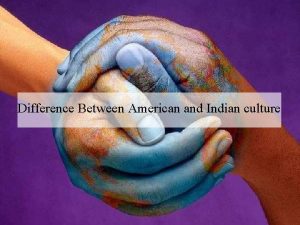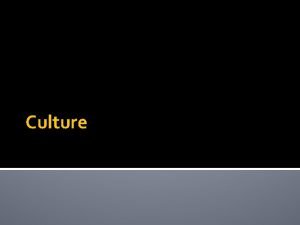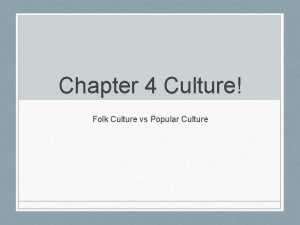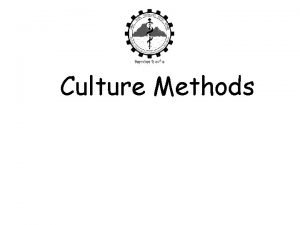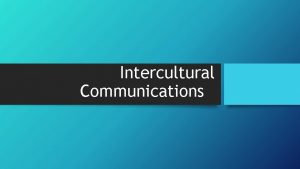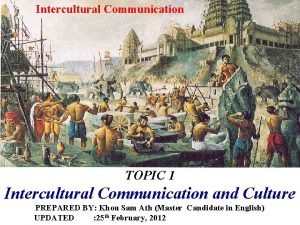PERSPECTIVES ON CULTURE INTERCULTURAL COMMUNICATIONS AND OURSELVES JAN










- Slides: 10

PERSPECTIVES ON CULTURE, INTERCULTURAL COMMUNICATIONS, AND OURSELVES JAN 29, 2019

OVERVIEW • Perspectives on ‘culture’ • Perspectives on intercultural communications • Story of self – How do you we communicate about ourselves? • Intercultural praxis • Activity – Identities and identifying perspectives • Reminder - Story of Self – Due Feb 1, 2019

PERSPECTIVES • Perspectives and viewpoints as an analytical lens • Not “right” or “wrong” • Definitions of terms and concepts shaped by historical, political, social, and cultural contexts • Fields of study defining terms and carrying out research to legitimize varying approaches • Your job – Understand identify different approaches • Place yourself in the information - What do you think?

PERSPECTIVES - CULTURE • Anthropology – “System of shared meanings that are passed from generation to generation through symbols that allow human beings to communicate, maintain, and develop an approach and understanding of life. ” (p. 4, Sorrells) • Cultural studies (informed by Marxist ideas on class) – Contested meanings of culture as the concept of culture shifts from an expression of local communal lives to a view of culture as an apparatus of power within a larger system of domination • Goals, ideas, and interests of the ruling group are normalized, institutionalized, and accepted so that people consent to their own “domination, subordination, and exploitation (p. 5). ” • Representation, particularly in mass media, continually reproduces inequalities and marginalization • Globalization – Culture is conceptualized, experienced, exploited, and mobilized as a resource • Quick summary - (1) culture as shared meaning, (2) culture as contested meaning, and (3) culture as resource

PERSPECTIVES – INTERCULTURAL COMMUNICATIONS • Anthropology - Culture as a shared system of meaning • Communication is a process of transmitting and sharing information among a group of people. • Communication enables culture to be co-constructed and mutually shared by members of a group. • Cultural studies - Culture is a contested site of meaning • Communication is a process through which individuals and groups negotiate and struggle over the “agreed upon” and “appropriate” meanings assigned to reality. • Through verbal and nonverbal communication, some views are privileged and normalized while others perspectives are marginalized or silenced. Communication is a process of negotiation, a struggle for power and visibility, rather than a mutual construction and sharing of meaning. • Globalization - Culture is viewed as a resource • Communication can be viewed as a productive process that enables change/“productive” means that communication is a generative process. • People leverage culture to build collective identities and exploit or mobilize for personal, economic, or political gain. Communication is a process of utilizing cultural resources.

CULTURE – YOUR PERSPECTIVE • Which, if any, of these definitions of culture and intercultural communications match with your own worldview? • How might varying definitions of culture shape how we see and communicate about our own identities?

STORY OF SELF – HOW DO WE COMMUNICATE WHO WE ARE? • Cultural identity - Our situated sense of self that is shaped by our cultural experiences and social locations • Dominant and non dominant cultures • Dominant – may not express a strong sense of ‘culture’ • Non dominant – may be described around certain aspects and sometimes in opposition to or around dominant culture • Constant reminders of differences – even when positively discussing ’diversity’ • Positionality - One’s social location or position within an intersecting web of socially constructed hierarchical categories such as race, class, gender, sexual orientation, religion, nationality, abilities, etc. • Different experiences, understanding, and knowledge of oneself and the world are gained, accessed, and produced based on one’s positionality. • Positionality is a relational concept - We are positioned in relation to others within these intersecting social categories and in terms of power. • Standpoint theory - A standpoint is a place from which to view and make sense of the world around us. Our standpoint influences what we see and what we cannot, do not, or choose not to see. • Ethnocentrism - One’s own group’s way of thinking, being, and acting in the world is superior to others.

PERSPECTIVES – INTERCULTURAL PRAXIS • Intercultural praxis - a way of being, thinking, analyzing, reflecting, and acting in the world • (1) Inquiry, (2) Framing, (3) Positioning, (4)Dialogue, (5) Reflection, and (6) Action. • Inquiry – A desire and willingness to know, to ask, to find out, and to learn. • Challenge and be challenged • Suspend judgment • Risk-taking and vulnerability • Framing – Our perspectives and our views on ourselves, others, and the world around us are limited by frames. We see things through individual, cultural, national, and regional frames or lenses that include some things and exclude others. • Positioning – Understanding how and where we are positioned in the world • Dialogue – Fully engaging in dialogue – transformational and oppositional • Reflection – The capacity to learn from introspection • Action – Joining increased understanding with responsible action

YOUR TURN – COMMUNICATING YOUR IDENTITIES • Write down 5 -10 ways that you identify yourself • (i. e. race/class/gender/educational status, etc. ) • Circle 3 that you consider to be central to your sense of self/identity • Look at all of your identities and think about a stereotype about one of your identities. Does it accurately describe you or fail to describe you? • Turn to a partner and discuss the previous prompts. • What was it like to select pieces of your identity? • Why did you select the top three in the way that you did? • Was it difficult to think of a stereotype about parts of your identity? • Quick/free write – Write some quick reflections on the exercise in relation to the lesson today.

• Tucker Carlson CULTURE AND COLLEGE • “The King of Cable News” – Forbes • “Highest rated hour in cable news” – Forbes • Focuses on diversity, culture, and free speech on college campuses • As you’re watching: • What are their approaches to ‘culture’? • How do they define ’culture’? • Are there power differentials in the way that ‘culture’ is discussed? • What are some of their main concerns about the future of higher education? • How does this match with your own experiences?
 Non material culture
Non material culture Continuous culture and batch culture
Continuous culture and batch culture Indian culture vs american culture
Indian culture vs american culture Stroke culture method
Stroke culture method Folk culture and popular culture venn diagram
Folk culture and popular culture venn diagram Chapter 4 folk and popular culture
Chapter 4 folk and popular culture Anaerobic media
Anaerobic media Folk culture and popular culture venn diagram
Folk culture and popular culture venn diagram Stab culture and stroke culture
Stab culture and stroke culture Robertson cooked meat medium
Robertson cooked meat medium Surface culture deep culture and esol
Surface culture deep culture and esol


